A vote of no confidence in UK's pricing system

Pharma industry personnel have indicated a deep lack of confidence in the UK's new medicines pricing system, and believe it won't foster the industry or help patients access the best medicines.
A pessimistic picture emerged from the live audience voting carried out at the PharmaTimes debate on the new PPRS and Value Based Assessment system, introduced in January 2014 and intended to support innovative new medicines and provide value for money for the NHS.
There were around 80 attendees at the event held yesterday at The Royal Institute in London, mainly from pharma companies and industry service suppliers, with keypad voting producing a series of straw polls.
Opinions were sought before and after a debate around the key issues – and saw the audience grow more pessimistic about the new system and the chance of improving access to medicines in the UK market.
A full 78% concluded that the new PPRS was not a success for all companies, with 75% believing that the deal was not good for patients.
The new system imposes and overall cap on the NHS' branded medicines bill, with pharma companies required to re-pay any surplus money spent on their medicines.
Newly launched medicines are excluded from this mechanism, a move intended to allow free prescribing of the best new medicines.
However numerous audience members expressed doubts about this being enough to encourage use of new medicines, with many more factors in place to slow down uptake.
Vincent Lawton, a former head of Merck Sharp & Dohme UK and former ABPI President, who had negotiated several earlier PPRS deals himself said: "I find it difficult to see how we justify saying this is pro-innovation. "
The deal was agreed between the Department of Health and the ABPI on behalf of the industry after protracted negotiations stretching over two years.
Confusion and scepticism remain
The new scheme also includes a 'Value Based Assessment' (VBA) component for assessing new medicines, an as-yet-unfinalised process to be overseen by NICE.
NICE's programme director of technology appraisals Meindert Boyson was among the speakers, explaining the Institute's proposals for the new VBA health economic assessment, and said the plans would be open to consultation.
Despite Boyson's explanation, however, 49% of the audience confessed to still being confused about how it would affect the introduction of new medicines.
No representative of the ABPI was there to defend the scheme, which was roundly attacked by some audience members, one industry veteran calling the deal 'a disaster' and urging ABPI member companies to demand the deal be torn up and renegotiated once again.
The Department of Health elected to send its official, Cathleen Schulte, to explain the logic behind the new deal – despite the fact that she had only being working in the pricing department for six months, and professed herself 'no expert on the PPRS'.
The new PPRS was criticised by representatives of small to medium sized companies in particular, as many of these stand to lose out under the deal. However scepticism about the new system and its supposed benefits to patients and industry were also expressed by representatives from major pharma companies.
Another of the speakers was Eric Low, chief executive of Myeloma UK, who was also highly critical of the new scheme and the Department of Health and the ABPI. He said that negotiations were conducted by these two 'usual suspects,' and should not have been done behind closed doors without the input of patient representatives.
He said the new deal had failed to focus on improving services for patients, which he believed requires greater control to be handed to doctors and patients to decide the best treatment together.
Chairing the event was GP and journalist Dr Phil Hammond, who said he believed the new system was unlikely to help patients gain access to the best new medicines because of the strict guidelines doctors must now work within.
Links
Redefining Market Access - Effective Value Engagement











